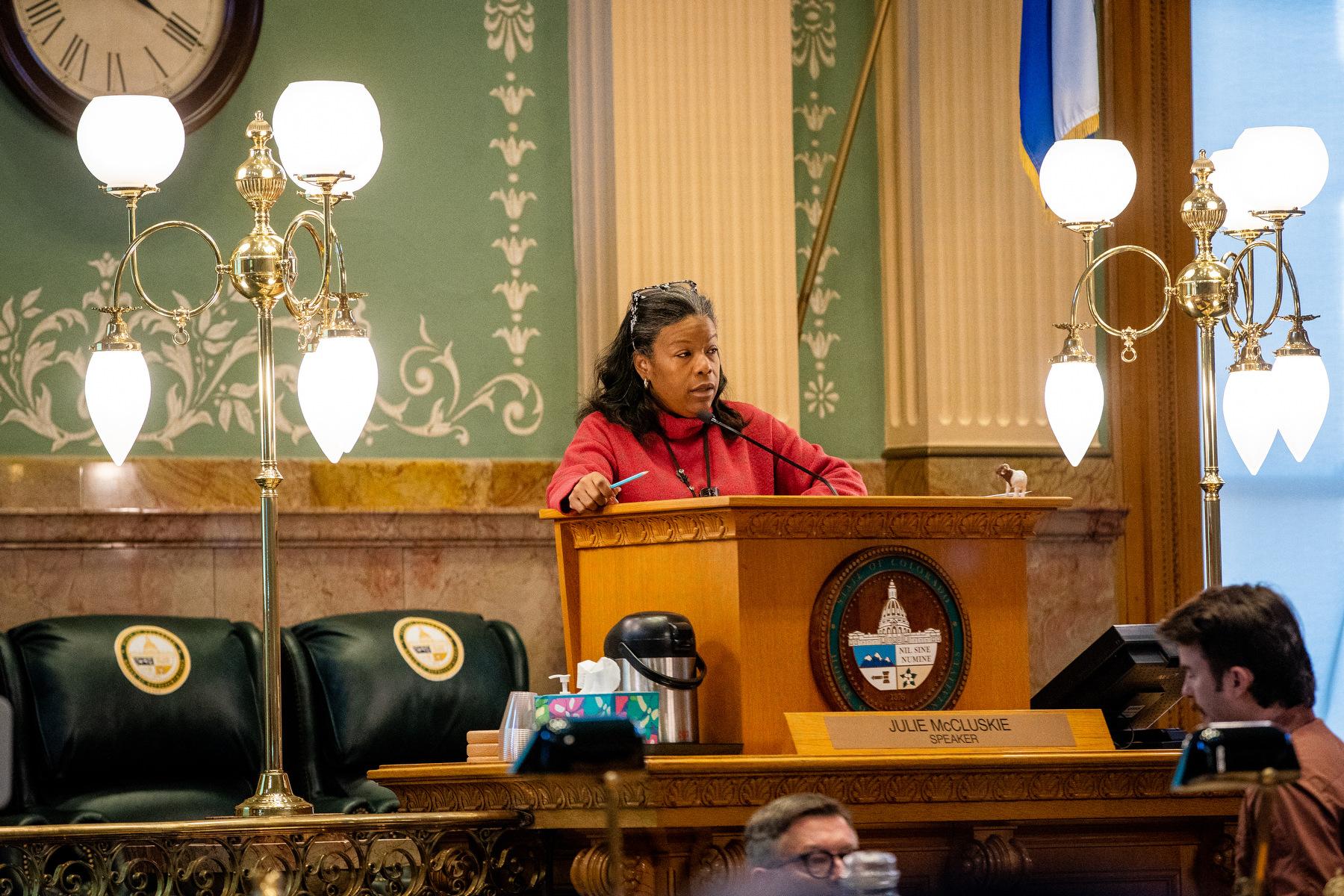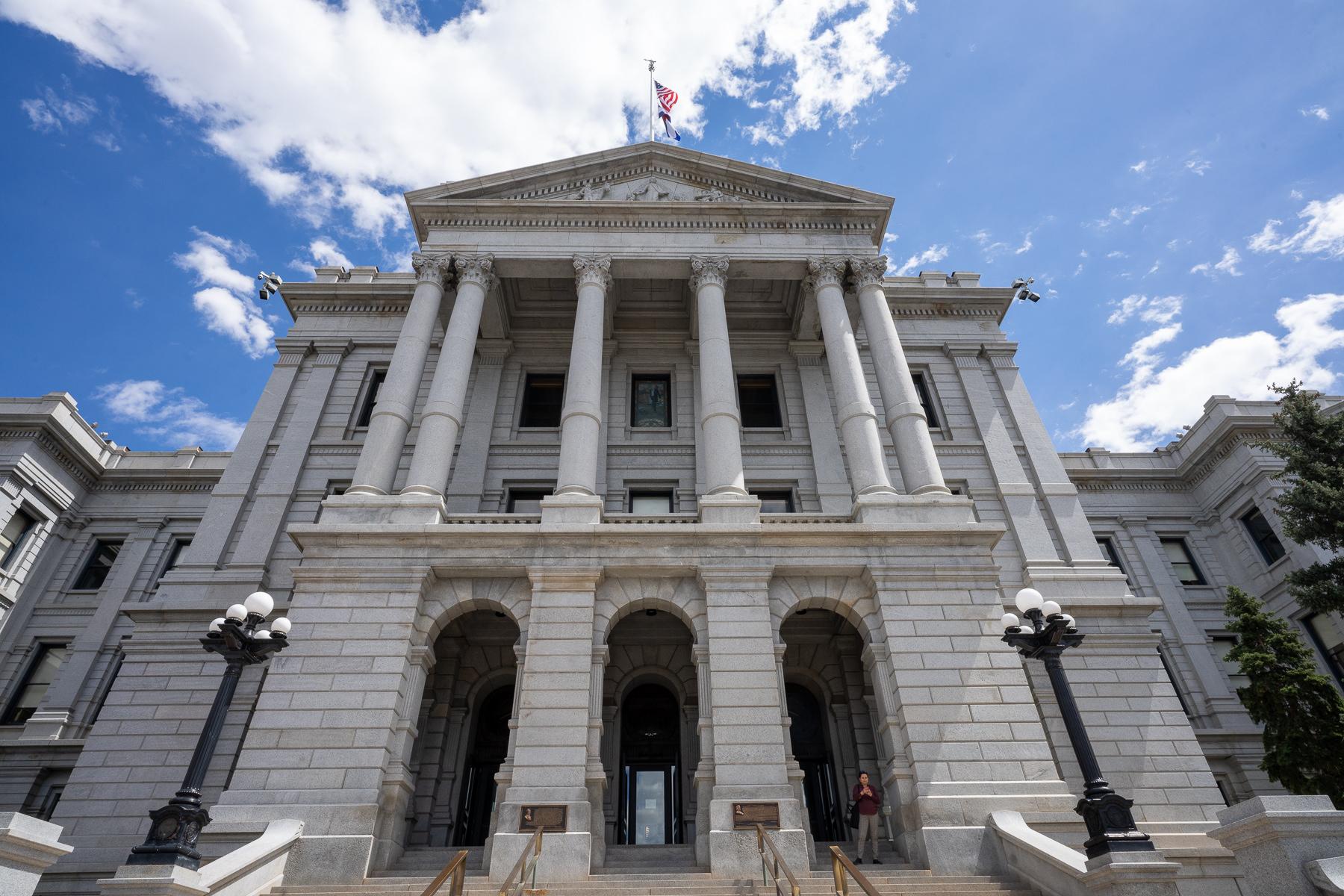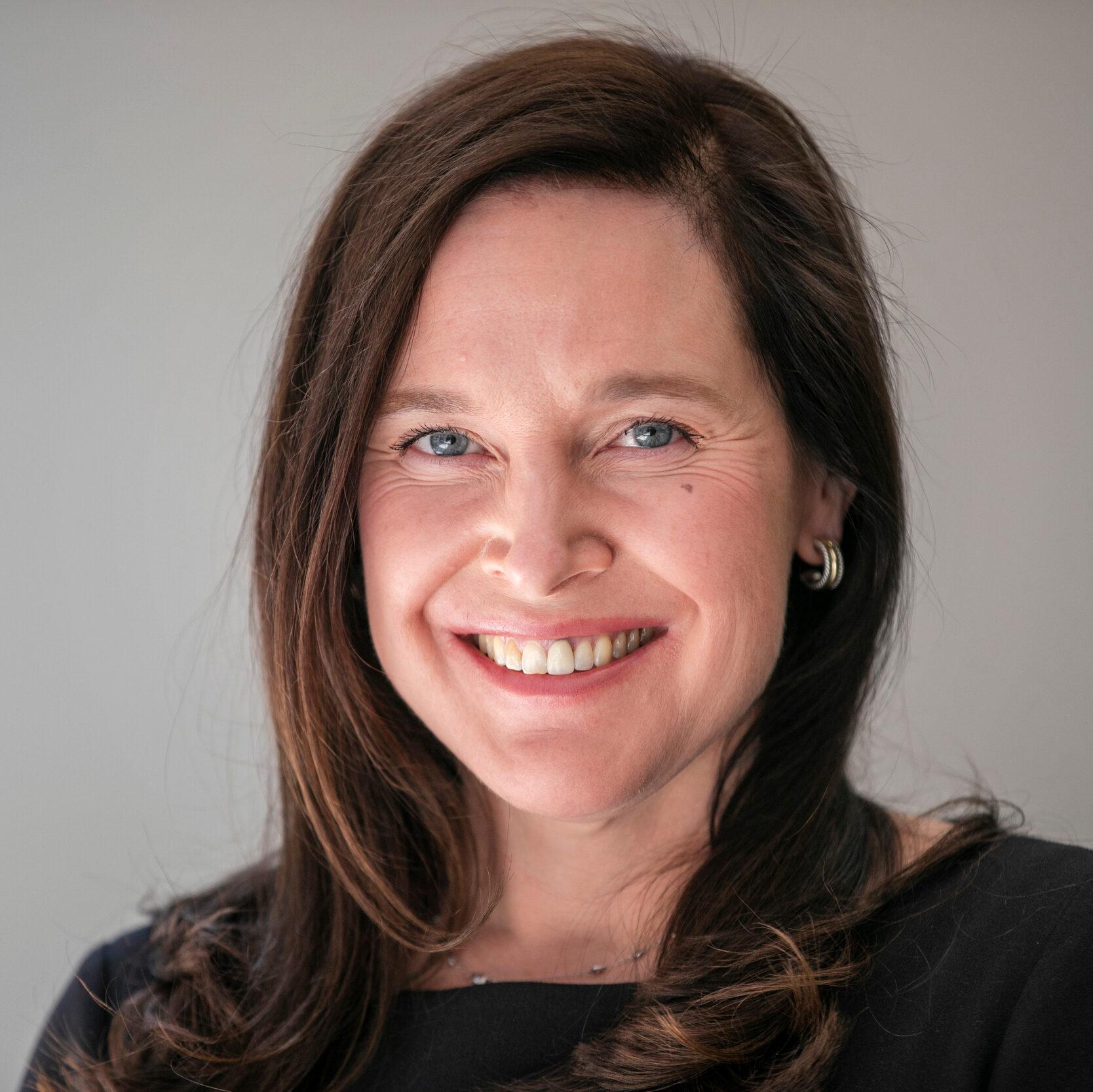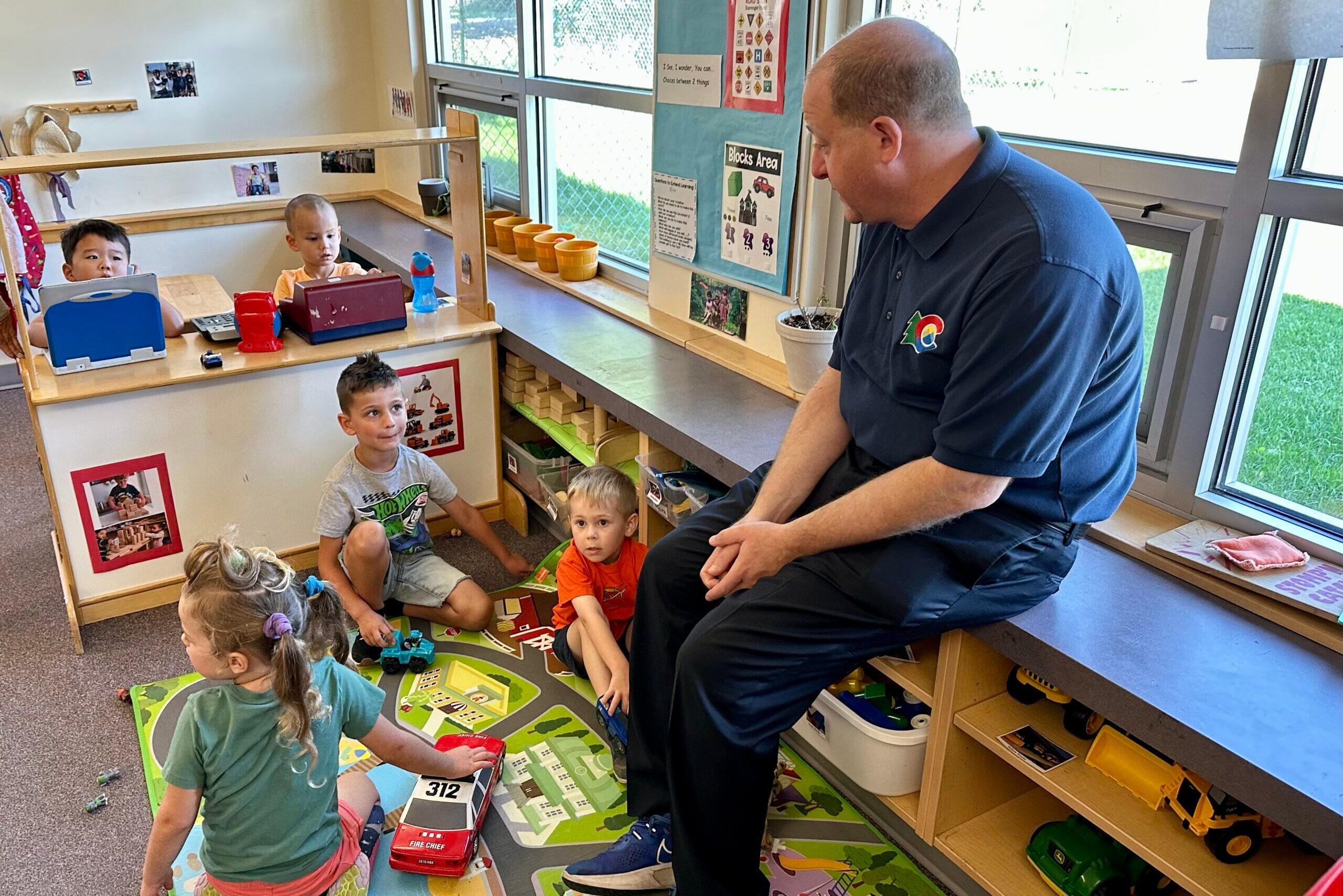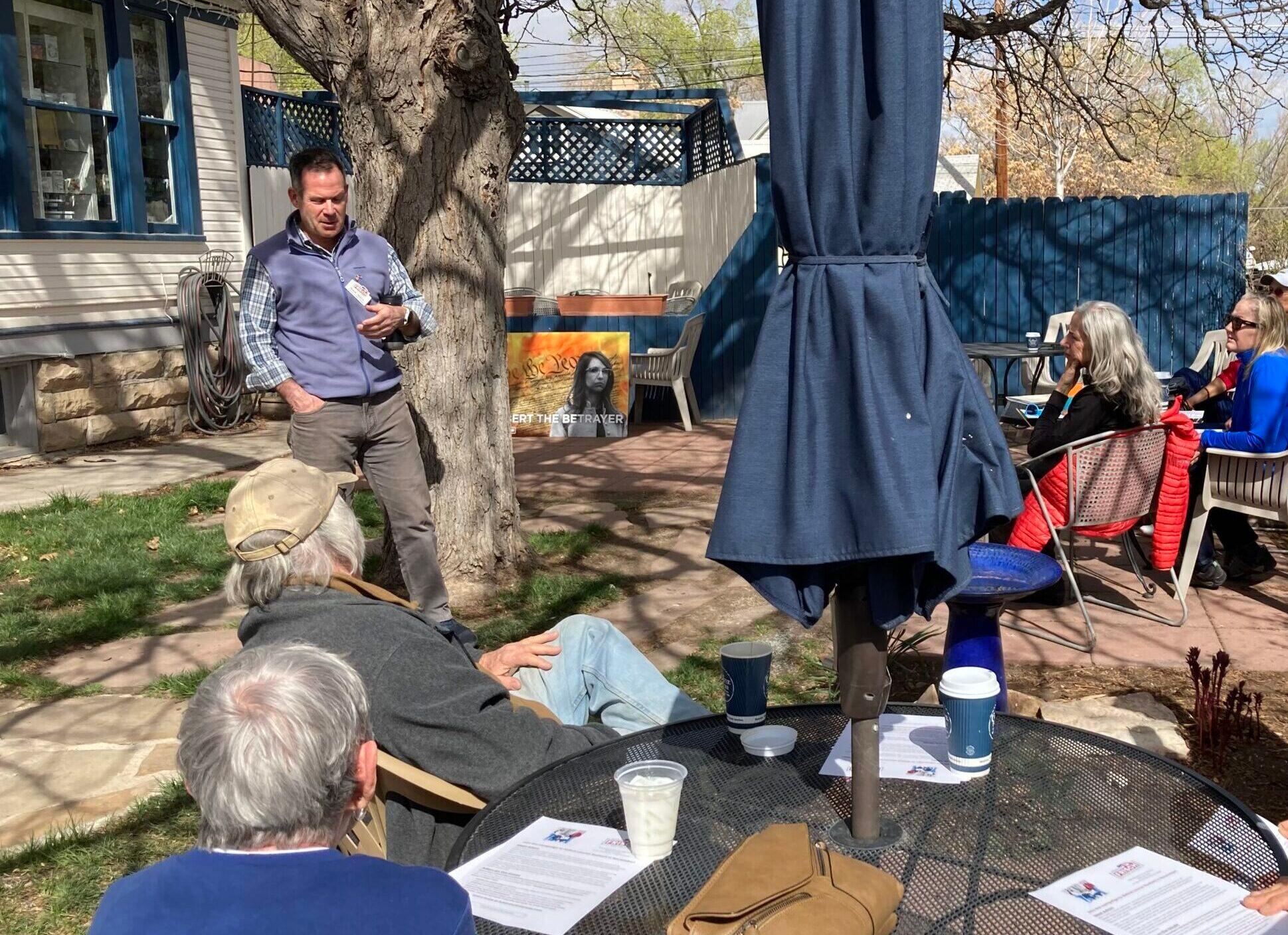
Encompassing part of the Western Slope, CD-3 is a district as red as a Colorado Mesa: it hasn't elected a Democrat to office since 2008. Adam Frisch wants to change that, but to do so he'll have to win against Lauren Boebert, the incumbent and one of the GOP's rising stars.
While acknowledging the sizable challenge before him, Frisch insists there's a very tangible path to victory that involves creating a “pro-normal coalition.” That’s in contrast with what he calls the “angertainment” that has become prevalent in today’s politics.
“Our current representative and her best friend, [Georgia Republican Representative] Marjorie Taylor Greene, are running around the country yelling and screaming and firing a lot of people up about issues that have nothing to do [with] what I know the men and women and children and families and businesses are focused on in Western and Southern Colorado,” Frisch said. “It's about building coalitions and focusing on the job and passing legislation and discussing things in a thoughtful and calm manner.”
Frisch, a businessman and former Aspen City Councilperson, spoke with Colorado Matters host Ryan Warner on a number of topics, including water, student loan debt and foreign policy.
This conversation has been edited for clarity and length.
Warner: What's an important way you would change how CD-3 is represented?
Frisch: Right now, I don't think the district's being represented. That's the main reason I'm running. I think our current representative, [Republican Lauren Boebert,] is part of that leader of this angertainment industry that our current representative and her best friend, Marjorie Taylor Green, are running around the country yelling and screaming and firing a lot of people up about issues that have nothing to do what I know that the men and women and children and families and businesses are focused on in Western and Southern Colorado.
I've been a bipartisan, consensus building, successful business person. I've been the same thing in the nonprofit world; The same thing when I was doing what I call “elected community service” when I was a City Councilperson for eight years. It's about building coalitions, focusing on the job, passing legislation and discussing things in a thoughtful and calm manner. That's something that I believe 80 percent of the people want to happen in the United States. I think that's 80 percent of what members of Congress are trying to do. And unfortunately, those people are not the ones on television all the time.
Warner: So that's an example of how you would change the style: The end of what you call “angertainment.” And yet, Lauren Boebert was elected in the first place and also won her primary, so unaffiliated and Republican voters chose her over an alternative. What is an example of an issue that you think she is not paying attention to that affects people in the CD-3?
Frisch: I think those issues have to do with inflation and economic challenges we have ahead; They have to do with water; They have to do with the rural aspects of healthcare; They have to do with the rural aspects of education to make sure that there's the right amount of funding, so it's not just the wealthy big cities or the wealthy resort communities that are being looked after when it comes to education. I think those are the issues that I don't see her focused on at all.
In the primary, I think it's a huge sign of weakness when any incumbent cannot even get two-thirds of their own party to vote for them. She had 36 percent of the people in her own primary vote against her. Our plan is to build a bipartisan, pro-normal coalition and we'll need about a third or a fourth of those that voted against her in the primary. That's the coalition that we're going to use to see her defeated.
Warner: Did you use the term “pro-normal”?
Frisch: Yeah, I am building a bipartisan, pro-normal party coalition.
Warner: There's a lot there that I'd like to unpack. Why don't we start with inflation? Do you think Democratic policies and the amount of federal spending — relief spending — is a contributor to inflation?
Frisch: The Fed was very late to realize that the inflation numbers that were coming out were not just transitory, which is Fed-speak for temporary. I think President Biden and his economic team were also late to the party in realizing that this was not going to be a temporary move up in inflation. I am very supportive of the bipartisan infrastructure bill and the bipartisan first COVID bill that came from the Problem Solvers Caucus, which is made up of 29 Democrats and 29 Republicans in the House. And it's been my stated goal from Day One to join that.
I know Joe Manchin has frustrated a lot of people, but I'm glad that he stepped in and put some brakes on some of the later proposed infrastructure bills. Because I think that spending would have been unnecessary, and it's hurting the exact people that I think a lot of people are trying to focus on.
Warner: I wonder, to some extent, if you have to run against Democrats to win this district. You often use the term “conservative” to describe yourself, seeming to eschew the label “Democrat.” Is that to increase your odds of winning?
Frisch: No. It's to increase the ability for people to understand who I am and where I'm coming from. I was an unaffiliated voter for 36 years and I joined the Democratic Party officially at the end of December to make sure that I had the possibility of running against Lauren Boebert in the general election. I made it very, very, very clear in the entire process of the primary that I was a pro-business, pro-energy, moderate, pragmatic Democrat.
Warner: You talk about energy, so that is to say you would rather see drilling here than abroad. Do you want to see a day when there is no drilling?
Frisch: I think the goal is that there is renewable energy produced locally, across the world. So there's no such thing as a transmission line or a transition pipeline of anything. But the reality is that there's a certain amount of demand that I wish we had spent more time focusing on: Reducing that demand. But, when we reduce energy being produced in Colorado or in the United States — we're not getting solar power from Denmark. We're getting pretty much the exact same type of energy from countries that I don't think are helpful for us; I don't think they're helpful for the world.
I think that employment laws and the energy regulations that we have in Colorado, let alone the United States, are much better for the climate and for the global workforce than they are coming from Iran or Venezuela or Russia.
Warner: Let's get to another issue. You called President Biden's Student Loan Forgiveness Plan “reckless,” saying it is executive overreach: "Rather than forgiving loans for top income earners, we need to level the playing field." But there is an income cap on thi, so help me understand your thoughts here.
Adam: I am a big believer in education. When COVID started, I obtained my substitute teaching license and spent a couple days a week with pre-K through fourth grade, because I believe — as well as my wife, Katie, who's now the president of our local school board — that kids need to be in school pretty much at all costs. And sadly, that report that came out nationwide two weeks ago showed a 40-year low in what we've lost at the elementary and the high school testing scores. Without a doubt, college is important, [but] It's not the only path forward. There's Vo-Tech and there's apprenticeships and there's community colleges.
You've seen this happen over and over again, when presidents get frustrated with the congressional path and they decide to pull out a pen and call an executive order. So let's remember, for the record, Nancy Pelosi and President Biden, both said that they don't think that he had the legal authority to do this, and all of a sudden, he comes up with the legal authority to do it.
Two, I realize there's a focus on those that are making less than $100,000 or $80,000, but still there's a lot of money that is going to be going to those that are making over $80,000 or $90,000 a year.
Warner: You think that's too high?
Frisch: I do think it's too high. I think there's a couple things people need to realize. Only one-third of adults in the country have a four-year Bachelor's degree or above. Democrats are shocked to hear that it's that low. College is a great path for many, but it's not the only path to have a successful life monetarily.
Two, there's an income cap up to $250,000 and I've been getting some pushback from some people and I'm telling people, if you think $200,000 is "not that much money," this is exactly why the Democratic Party has lost a good chunk of the working class and a good chunk of rural America over the past 30 years. What I'm focused on are those that are truly middle class and below.
Warner: Who are you endorsing in the U.S. Senate race between incumbent Democrat Michael Bennett and Republican Joe O'Dea?
Frisch: Michael Bennett, without a doubt. I am a Democrat. I think he's done a great job for the entire state and that's what I'll be supporting.
Warner: Should Congress move to protect abortion federally, or should it remain a state-by-state issue?
Frisch: I wish Roe vs Wade would have stayed [in place] for all sorts of reasons. And I think more and more Republicans are realizing they wish it had stayed, too. Look at what happened in Kansas, which [has] a lot of the same demographics as CD-3. They ended up winning by 19 points. And all of a sudden, you're seeing Republican candidates literally take their abortion thoughts and feelings off their websites.
Editor’s note: Some Republican candidates have downplayed, or removed, mentions of abortion on their websites, according to The New York Times.
Warner: CD-3 is Colorado's largest district, geographically encompassing the Southern portion of the plains, Pueblo, Durango and Grand Junction. How much is the map a challenge as you shake hands or bump elbows?
Frisch: It's a challenge when your district's larger than the state of Mississippi on a square-mile basis. It takes eight hours to drive from one part of it to the other, but it's a beautiful challenge and it's invigorating because you have a chance to meet so many different people from all over: agriculture, ranching or the people that are on the energy producing side. Then we have our mountain towns and those that are really happy to live in the most rural parts of the country.
I love meeting people and hearing their stories and having a chance for them to learn a little bit about me. I have a lot more in my background than just being from a mountain town over the past 20 years.
Warner: A quarter of this district identifies as Hispanic. That is a broad and diverse community in and of itself, but how are you hearing from that community and what are you hearing?
Frisch: When I first started this, I got a hold of the Colorado Latino policy agenda, which was a big study that was done recently, and you see that the Hispanic community on the whole has the same concerns as the Anglo community. People want to make sure that they live in a safe community, they want to make sure that they have economic opportunity and economic stability. They want to make sure their kids are going to a good school and a safe school, and they care about the conservation of public lands.
While a lot of people try to dissect all these little subgroups and sub-subgroups, the vast majority of people are focused on pretty much the same things. And the reason I'm running is I think the vast majority of those people don't feel that they're being supported by their current representative.
Warner: Earlier in the conversation, you invoked water. A lot of the Eastern Slope gets water from the Western Slope. And it's a fascinating thing that your district includes both sides of the hill, as it were. What conversations are you having about water, especially given that the federal government is stepping in because of scarcity on the Colorado River?
Frisch: It's not just the Eastern Slope that gets water from the Western Slope; It's California, it's New Mexico, it's some parts of the Republic of Mexico, it's Las Vegas, it's Arizona. We have this compact that was started in 1922, and it was sadly set at some really high water levels. And I think what we've heard from the Bureau of Reclamation, which is in charge at a Washington, D.C. level of trying to figure out how to divvy up the water in the Western part of the United States. I think we are in for some frustrating and risky conversations and negotiations with these eight states.
I'm making the case: Who do you want in those rooms, negotiating? I think it's important that Colorado sends its best people that they think can negotiate. I don't think there's anything to do with partisanship; It all has to do with who has a track record of negotiating and who's going to focus on it and who's going to do a good job. The concern is that the agricultural community and the ranching community and the recreation community and the conservation community make sure that enough water stays in the Western and Southern part of Colorado to make sure that we have a thriving economy and a thriving climate and a thriving ecosystem.
Warner: I keep hearing you say that you're the right person to broker deals to arrive at compromise. What is an example of you doing that, either in business or when you were on the Aspen City Council?
Frisch: Well, I had a track record of traveling the world: I've been to about 40 or 50 countries for work and I did business in another 40 or 50 on the phone. So my entire time in New York City was negotiating and doing deals that provided a win-win, and doing them in a respectful manner. It might seem hokey in this day and age, but being able to compromise and listen to the other side, and not make fun of everyone else that doesn't agree with you is, I think, a time-tested skill set.
On my City Council stuff — spending eight years — I have a lot of good conversations with people at the City Council levels. I spent most of my time on City Council working on affordable housing and making sure that there was a good balance between the money that was going to come in. The land-use policies that need to change — to see that more density was going to happen in some communities. I think those density conversations are best left at the local level, but I do believe that all the really hard stuff we have left is going to require us to have people negotiating in good faith.
Warner: How difficult a hurdle is it for you to win in this district where Republicans and unaffiliated voters outnumber registered Democrats?
Frisch: It's uphill. I studied the numbers and in 2020, these seven or eight extremists on the right all had 65 percent to 75 percent wins. Lauren Boebert only won 51 percent of the vote in 2020, and she did not even win her home county, which is very rare. Those that know her don't care for her and a lot more people know her now.
The district has gone even more red; I think we need about 10 percent of her prior voters to switch. The fact that more than a third of them just voted against her, gives me the plan to victory.
It's a bipartisan, pro-normal party coalition that I'm working on. I don't care how people voted in 2016. I don't care how they voted in 2018. I don't care how they voted in 2020. I'm just focused on letting people know that in 2022, there's one question on that ballot: Who is the best person to represent you and your family and your business and your kids and your community for CD-3?
In this situation, I think Lauren Boebert is uniquely loud and weak. I know that there was a tremendous amount of buyer’s remorse when people voted for her in 2020. However they voted in 2020 was up to them. I'm just making a clear case that there's an option between sticking the course of loud and obnoxious and mean and petty, and a breath of fresh air.

